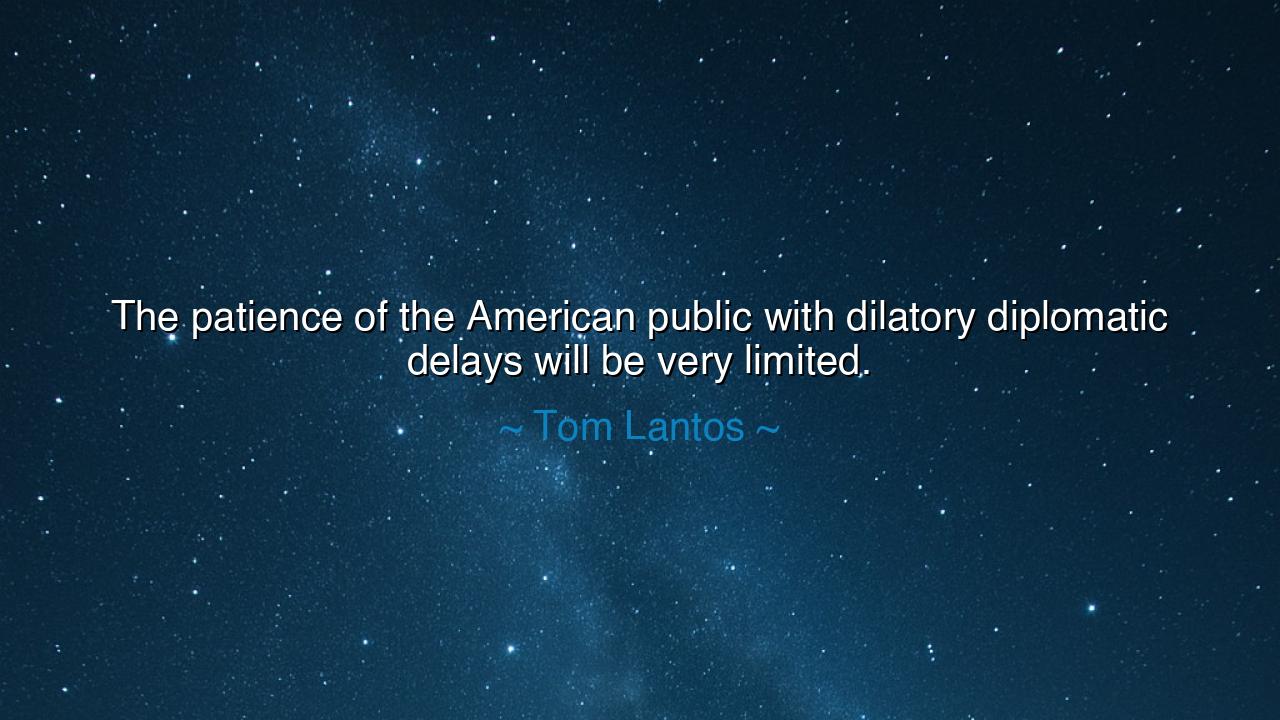
The patience of the American public with dilatory diplomatic
The patience of the American public with dilatory diplomatic delays will be very limited.






Hear the words of Tom Lantos, spoken with clarity and warning: “The patience of the American public with dilatory diplomatic delays will be very limited.” These words, though cast in the language of politics, carry the weight of an eternal truth—that no people will suffer endless hesitation when their hopes, their safety, and their honor are at stake. For diplomacy is a noble art when it brings peace, but when it lingers too long in words while injustice festers, the public will rise with impatience, demanding action.
From the dawn of nations, rulers have sought to balance patience with speed. Too much haste brings ruin, but too much delay breeds anger and distrust. The people may wait a season for promises to ripen, but if the fruit never comes, their loyalty withers. Thus did Lantos remind his time that the American public, though generous in spirit, would not endure endless diplomatic stalling. Their patience was not infinite; their tolerance for delay would soon be spent, and when it was, pressure for decisive action would grow irresistible.
Consider, O seekers, the tale of Neville Chamberlain and the policy of appeasement before the Second World War. Endless diplomatic words were offered, promises signed, papers waved in triumph. But while negotiations dragged on, the menace of Hitler’s armies grew stronger. The patience of the British people, at first eager for peace, gave way to fury when they saw that delay had not saved them, but endangered them. In their story, as in Lantos’s warning, we see the danger of trusting too much in words without timely deeds.
Yet let us not despise diplomacy itself. For it is better than war, and its delays can prevent the shedding of blood. But it must be true diplomacy, not the dilatory kind that hides indecision behind endless meetings, or masks cowardice with polite excuses. True diplomacy labors for resolution, while false diplomacy drifts like a ship without sail. Lantos’s words strike against the latter, reminding leaders that the people will not endure deception or endless postponement.
The deeper meaning of his saying is thus: patience is a noble virtue, but it is not limitless. When leaders misuse it, when they stretch it beyond justice, it becomes anger. And once a people’s patience is broken, it cannot easily be restored. The wise leader, therefore, must act while trust still endures, lest delay consume the very support he needs to govern.
The lesson is clear for all, not only rulers. In every relationship—whether between nations, friends, or families—do not confuse patience with permission to delay forever. If promises are made, fulfill them swiftly. If conflicts arise, seek resolution earnestly. Do not lull others into waiting endlessly, for their trust, like the trust of the American public, is finite. To abuse it is to lose it, and once lost, no diplomacy can restore it.
Practical wisdom lies in this: when you must negotiate, negotiate honestly; when you must act, act without hesitation. Respect the patience of others, but do not exploit it. In your own life, whether in work, in friendship, or in love, honor the time of those who wait upon you. Be swift in truth, steady in action, and sparing in delay. For in this way, you shall keep the bond of trust whole, and your words will not be counted as empty.
Therefore, O children of tomorrow, remember Tom Lantos’s warning. Patience is great, but it is not eternal. Use it wisely, respect it deeply, and never presume upon it endlessly. For when patience runs out, words will no longer suffice, and deeds—whether gentle or fierce—will come to take their place. And in that moment, the wise will be those who acted while patience still endured.






AAdministratorAdministrator
Welcome, honored guests. Please leave a comment, we will respond soon